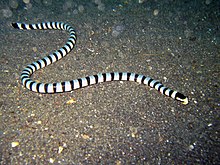Laticaudinae
| Laticauda | |
|---|---|
 |
|
| Laticauda colubrina | |
| Scientific classification | |
| Kingdom: | Animalia |
| Phylum: | Chordata |
| Class: | Reptilia |
| Order: | Squamata |
| Suborder: | Serpentes |
| Family: | Elapidae |
| Subfamily: | Hydrophiinae |
| Genus: |
Laticauda Laurenti, 1768 |
| Species | |
|
eight, see text |
|
eight, see text
Laticauda or sea kraits are a genus of venomous elapid snakes from the subfamily Hydrophiinae. They are semi-aquatic: they retain the wide ventral scales typical of terrestrial snakes for moving on land but also have paddle-shaped tails for swimming. Sea kraits are often confused with another group of aquatic reptiles: sea snakes. However, unlike the fully aquatic ovoviviparous sea snakes, sea kraits are oviparous and must come to land to digest prey and lay eggs. They also have independent evolutionary origins into aquatic habitats, with sea kraits diverging earlier from other Australasian elapids. Thus, sea kraits and sea snakes are an example of convergent evolution into aquatic habitats within Hydrophiinae snakes.
Sea kraits are semiaquatic and so have morphological adaptations to both land and sea. Laticauda species show traits intermediate between those of sea snakes and terrestrial elapids. They have a vertically flattened and paddle-shaped tail (similar to sea snakes) and laterally positioned nostrils and broad, laterally expanded ventral scales (similar terrestrial elapids). Their body has a striped pattern, nasal scales are separated by inter-nasals scales, and the maxillary bone extends forwards beyond the palatine bone. Members of Laticauda can grow to 1.5 metres (4.9 ft) long.
...
Wikipedia
